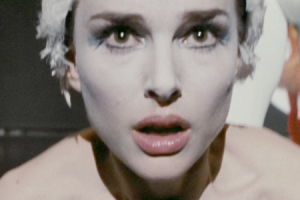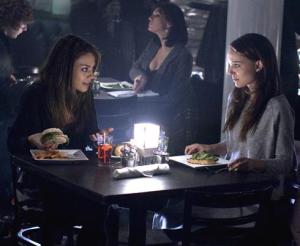Ian Fielding: Black Swan Revisited, Mum’s the Word
Posted: February 12, 2011 Filed under: Cinema, Film Ache, Ian Fielding, Uncategorized | Tags: Black Swan, Ian Fielding, Meaning, Natalie Portman 5 CommentsSince I wrote my original review of Black Swan, which you can find through the link below, I’ve developed and modified my position on the film’s secrets and meaning, and I’d like in this article to expand on my reading of the film’s dark subtext. As I stated in my original review, implanting difficult themes below the story surface is fairly standard screenwriting practice within certain genre films.
A quick recap: the film is ostensibly about a delicate, naive and innocent but highly talented ballet dancer who must access an edgier, more domineering and sexual part of her persona in order to successfully embody the role that she has won, that of the black swan, in Tchaikovsky’s Swan Lake.
We know Nina is already something on the edge but this challenge precipitates an incredible transformation that initiates delusions, terrifying hallucinations, self harm and eventually leads her to end her life.
So why? Why does the adoption of this role generate such a terrifying psychological upheaval within Nina?
For this role Nina is explicitly requested to interrogate her sexual character, a domain she has repressed from herself for a reason – namely that she is suffering from past and possibly continuing sexual and emotional abuse at the hands of her overbearing mother. It is as if the friction of simultaneous belief and denial about what has happened gives rise to these harrowing episodes.
Where is the evidence? Actually throughout the film it is continually dispersed. Firstly, Nina’s character, before her psychological meltdown, displays characteristics of an individual who has been abused, she is isolated, reserved, seems to find it hard to communicate with her fellow dancers, has possible trust issues, assertion issues, self-esteem issues.
Also look at the excessive infantilisation that she is subjected to, the childish bedroom with the stuffed toys, being dressed and undressed by mother. No lock on the door. When her friend Lily shows up at the door she is turned away by Erica, her mother. Infantilisation is a common practice deployed by abusers to forestall the sexual development of their victims.
When the dance choreographer Thomas kisses Nina she responds by biting his lip and then running away, is this deeply unusual act not the symptomatic behavior of the kind of person who has had to learn to defend themselves sexually?
Importantly the parallels between Lilly and Erica are continually made. Could it be that when Nina sees Lily she sees a safe or legitimate outlet for the sexual feelings that have been implanted in her by her mother?
Further hints arrive when Nina attempts to masturbate. Once on her bed and a second time in the bath. In the bedroom, Nina turns during the act to witness the presence of Erica asleep in her room, the presence is physically nonthreatening but deeply unnerving. In the bath the image has become a potential danger, it stares straight into Nina’s eyes, looking like some demonic mixture of Lily, Nina and Erica, as if the lines between these three characters has become blurred. Monstrously, Erica has invaded Nina’s fantasy space.
The key event in Nina’s sex life during the film is the night of her drugged drunken debauches, when she apparently takes Lily back to her apartment after having fucked (as she puts it), two boys in the nightclub. The mother appears, in exactly the same way as Lily appears to Nina in an earlier scene at the dance studio. Erica proceeds to fiercely admonish Nina as if no one else where there, uttering the telling phrase ‘Shut your mouth’ Now Nina runs to her bedroom and sleeps with a woman, and we know that Lily emphatically denies having been there. So who was with Nina? The person who was there clearly utters the phrase, ‘my sweet girl’ before holding a cushion over Nina’s head. This is Erica’s trademark phrase. This is only really the beginning of this series of disturbing clues. There are, echoing through the film, many more reverberations on this theme.
A very common reaction is to brush aside the logic of the picture by diagnosing Nina with schizophrenia and leaving it at that, without considering the origin of our hero’s disturbance. Sadly, and I think in this case, a little uncannily, this pattern all too often repeats itself outside of the cinema, in the real world.
Further evidence of the importance of cinema in mobilising public debate.
Read my original article HERE
My name’s Ian. I’m a writer and Filmmaker from London currently shooting my second feature film – a detective thriller called Dead Unicorns
To see pics, a trailer and what’s currently happening with Dead Unicorns click here:
http://deadunicornsfilm.wordpress.com
Follow FilmAche on Twitter








[…] Read my Black Swan follow-up article HERE […]
I see the emotional abuse but not the sexual abuse. And I have to make corrections to two remarks which I find really irritating: It was NOT the face of the mother Nina saw in the sex scene or in the bathroom scene, it is her OWN face she sees. Since I downloaded the film, I went back and checked this several times. I don’t even know how one can seriously see the face of the mother when it is so clearly Nina herself.
Emotional abuse is also a very serious topic, the sexual abuse is not even “necessary” to explain the movie. Like you said, yes, one of the underlying topics is abuse. But it is emotional abuse. The mother kept Nina from having an own identity, an own development, was over possessive and controlling literally all parts of her life, even the most initmate ones like sexuality. She prevented Nina from having an own sexuality. Nina had no identity, was weak and insecure. All she knew was being controlled and possessed. She never learnt to have an own opinion, to stand up for herself, to BE someone, to live. Her mother did not allow her to live. That is the reason why she was so fragile, had no normal connection with her own sexuality and was confused about this part of her life as well as about every other part of her life. To hear the sentence “sweet child” is a clear sign that her mother did not even leave her alone in her most intimate parts of her life and tried to take every space of Ninas life. Nina could not experience a thing like sexuality, which is strongly connected with freedom and liberation, because that was exactly what her mother tried to make not happen. Her mother was invasive, over-controlling and possessive (which is serious enough), but did not sexually abuse her.
I completely agree. I saw it this way too. I saw the emotional issues (I hesitate to say abuse, but she’s clearly possessive and domineering) between the mother and daughter, and I think it is that that dominates Nina’s confusion, introvertion, and self-repression.
Thank you for your comment. Doesn’t a film of ambiguity generate many perspectives? And isn’t one of the chief values of this film, the fact that it has brought a number of these difficult topics to a place of greater public awareness and understanding?
I agree that emotional abuse is a terrible perpetration for an individual to bear, capable of crushing that person’s vital life source.
Any grounds to expose and throw reasoned illumination onto this topic are completely validated in my opinion.
With regards to the article, the reason I stressed sexual rather than emotional abuse was the result of asking myself a question. Why is Nina’s emancipation seen as a negative event? If she is breaking free of her mother’s coda, shouldn’t that be experienced as a positive struggle? Instead the further Nina investigated herself the more terrifying and dislocated her reality became.
There is room here for a multitude of perspectives. Finally, I feel, the precise content of the fantasy of the story is less important that the fact that, because of its enlarged platform, it can potentially generate a positive echo of deeper understanding into society.
Thank you so much for your review.
I actually am a survivor of mother- daughter sexual abuse and for me the theme was totally obvious when I watched the movie.
I am very much like Nina Sayers.
It enrages me to no end, that no one points out how Nina’s mother is destroying her daughter and that no one asks where Nina’s “sickness” derives from. Everyone just say “she’s crazy” and that’s it. As you said at the end, that is something that happens in everyday life, too.
I am happy that this movie brought light to the subject. But I am sad, that this theme went over the head of the overwhelming majority of the audience.